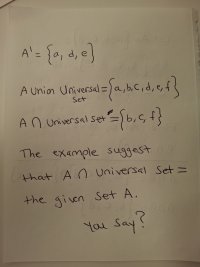You are using an out of date browser. It may not display this or other websites correctly.
You should upgrade or use an alternative browser.
You should upgrade or use an alternative browser.
Complement of A Set
- Thread starter mathdad
- Start date
blamocur
Elite Member
- Joined
- Oct 30, 2021
- Messages
- 3,104
Which of the two parts you don't understand? Which answers do you expect and why?It follows from the definition of a complement of a set that set A union with set A complement = universal set and set A intersected with set A complement = empty set. I don't understand why that is the case.
Dr.Peterson
Elite Member
- Joined
- Nov 12, 2017
- Messages
- 16,619
Have you tried making an example? Suppose the universe is {a,b,c,d,e,f} and A = {b,c,f}. What is A'? What are the union and intersection? What does the example suggest in general?It follows from the definition of a complement of a set that set A union with set A complement = universal set and set A intersected with set A complement = empty set. I don't understand why that is the case.
mathdad
Full Member
- Joined
- Apr 24, 2015
- Messages
- 925
I made an example using the 5 boroughs of NYC. Is my work correct?Have you tried making an example? Suppose the universe is {a,b,c,d,e,f} and A = {b,c,f}. What is A'? What are the union and intersection? What does the example suggest in general?
mathdad
Full Member
- Joined
- Apr 24, 2015
- Messages
- 925
See my example concerning the 5 boroughs of NYC.Which of the two parts you don't understand? Which answers do you expect and why?
Dr.Peterson
Elite Member
- Joined
- Nov 12, 2017
- Messages
- 16,619
Do all that I suggested, not just the first bit, which I already knew you could do.See my example concerning the 5 boroughs of NYC.
mathdad
Full Member
- Joined
- Apr 24, 2015
- Messages
- 925
See picture.Have you tried making an example? Suppose the universe is {a,b,c,d,e,f} and A = {b,c,f}. What is A'? What are the union and intersection? What does the example suggest in general?
Attachments
Dr.Peterson
Elite Member
- Joined
- Nov 12, 2017
- Messages
- 16,619
True, but that's not the problem you asked about, and the example I suggested:See picture.
It follows from the definition of a complement of a set that set A union with set A complement = universal set and set A intersected with set A complement = empty set. I don't understand why that is the case.
Clearly I was referring to the union and intersection you asked about, namely of A and A'.Suppose the universe is {a,b,c,d,e,f} and A = {b,c,f}. What is A'? What are the union and intersection? What does the example suggest in general?
What you found is [imath]A\cup U=U[/imath] and [imath]A\cap U=A[/imath]. You didn't even use the complement.
Try again, and actually answer your question, rather than one you make up on the spot.
blamocur
Elite Member
- Joined
- Oct 30, 2021
- Messages
- 3,104
I don't see how this answers my two questions.See my example concerning the 5 boroughs of NYC.
mathdad
Full Member
- Joined
- Apr 24, 2015
- Messages
- 925
Sorry. What are the two specific questions that you want me to address?I don't see how this answers my two questions.
blamocur
Elite Member
- Joined
- Oct 30, 2021
- Messages
- 3,104
See post #2.Sorry. What are the two specific questions that you want me to address?
mathdad
Full Member
- Joined
- Apr 24, 2015
- Messages
- 925
See post #2.
I can picture set A as a circle inside a larger rectangle representing the universal set U. The complement of set A is everything outside the circle.It follows from the definition of a complement of a set that set A union with set A complement = universal set and set A intersected with set A complement = empty set. I don't understand why that is the case.
You say?
If I combine A and A' (union), does that cover the entire rectangle (U)?
If I look for elements in both A and A' (intersection), I will probably find nothing or empty as in empty or null set.
You say?
blamocur
Elite Member
- Joined
- Oct 30, 2021
- Messages
- 3,104
Yes it does.If I combine A and A' (union), does that cover the entire rectangle (U)?
Why "probably" ?If I look for elements in both A and A' (intersection), I will probably find nothing or empty as in empty or null set.
mathdad
Full Member
- Joined
- Apr 24, 2015
- Messages
- 925
I found this online:Yes it does.
Why
A set and its complement always equal the empty set because by definition, a complement contains all elements that are not in the original set, meaning there is no overlap between the two, resulting in an empty set when you try to combine them (i.e., their intersection is empty).
You say?

